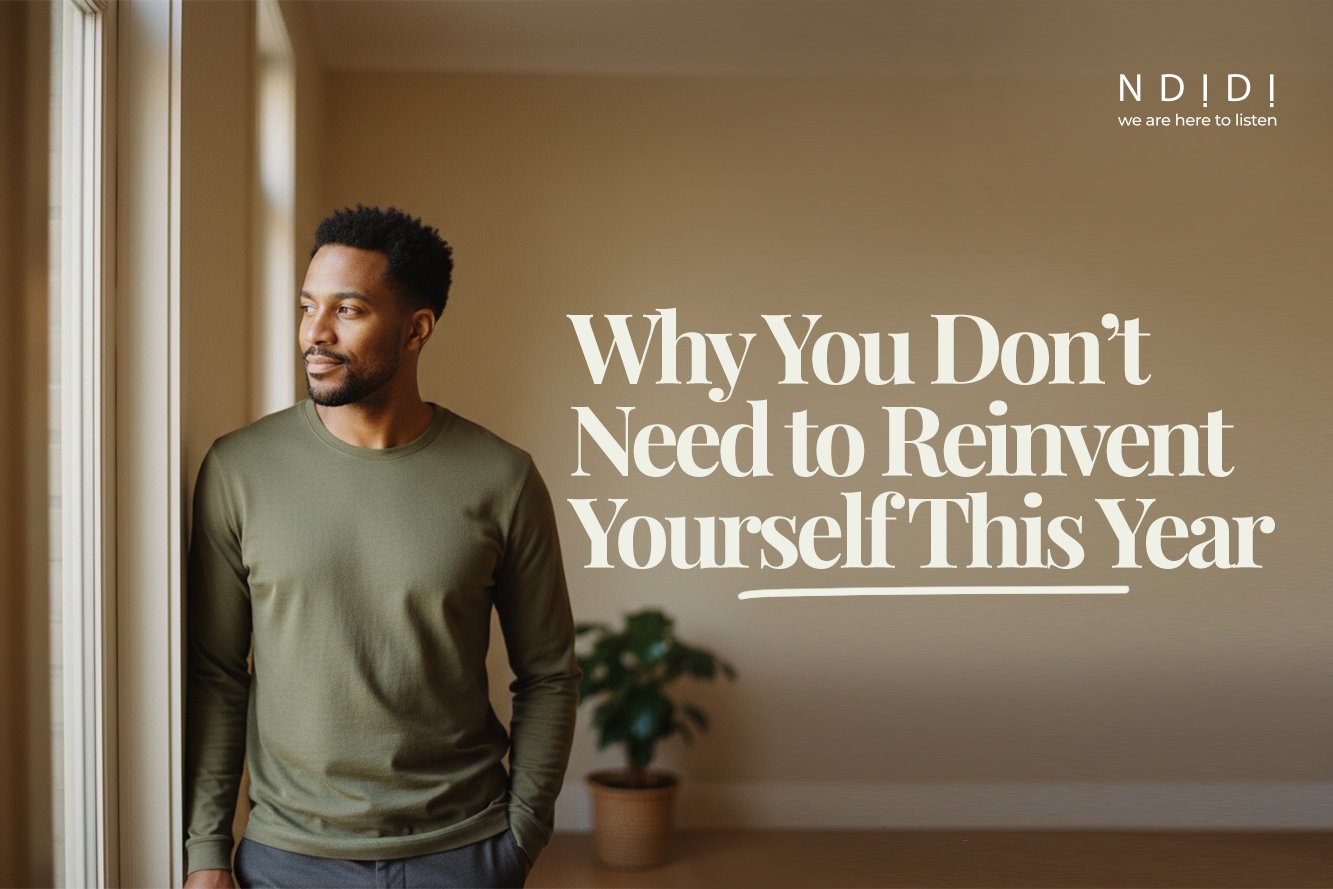Welcome to The NDIDI Blog
Here we explore culturally conscious insights on mental health, healing, and everyday well-being, shaped by African experiences, real stories, and professional research.
This is where we make sense of mental health in our context, as Nigerians, as Africans, as people navigating layered identities, expectations, and emotional histories.
Check out our latest blogposts below
Why You Don’t Need to Reinvent Yourself This Year
Every January in Nigeria and across many countries comes with pressure disguised as motivation.
“New year, new me.”
“Glow up season.”
“Leave your old self behind.”
You hear it in church, on Instagram, at family gatherings, even in casual conversations. It sounds hopeful, but for many people, it quietly becomes exhausting. Because what if you’re tired of reinventing yourself every year? What if you’re still carrying wounds from last year? What if you didn’t fall apart, you just grew slowly?
How to Reflect on Your Year Without Shame or Pressure
It’s December, and social media is flooded with “2025 wins” and highlight reels. Everyone seems to have had a year of breakthroughs, growth, and soft-life moments. Meanwhile, some of us are quietly scrolling, thinking: Did I even survive this year? Or worse, did I fail somehow?
If that sounds familiar, you’re not alone. For many Nigerians, reflection has become another source of stress. We’re conditioned to celebrate achievements, hide struggles, and avoid shame. But the truth is, reflection doesn’t have to feel like a performance. Healing and understanding your year isn’t about having a perfect story to tell; it’s about truth, self-compassion, and emotional honesty.
This blog post explores how to reflect on your year without pressure or guilt, drawing on psychology, practical tips, and culturally relevant examples.
healing, most people imagine soft music, therapy journals, candles, and gentle affirmations. But healing isn’t always calm or graceful; sometimes it’s messy, loud, or painfully quiet. For many Nigerians, healing means breaking through layers of cultural conditioning that have long demanded silence, endurance, and constant strength.
Healing Doesn’t Always Look Soft: Sometimes It’s Anger, Silence, or Saying No.
When we hear the word healing, most people imagine soft music, therapy journals, candles, and gentle affirmations. But healing isn’t always calm or graceful; sometimes it’s messy, loud, or painfully quiet. For many Nigerians, healing means breaking through layers of cultural conditioning that have long demanded silence, endurance, and constant strength.
Beyond the Hashtags: Real Suicide Prevention in the Digital Age
Most times, awareness often begins with a hashtag. #EndSARS, #JusticeFor…, #SuicidePrevention, the internet has become a rallying point for voices that once went unheard. When it comes to suicide prevention, social media has indeed created a global stage for mental health conversations. But as a clinical psychologist, I often ask: what happens after the hashtag fades
Black Tax and Mental Health: The Unspoken Burden on Young Nigerians
If you’ve ever argued over weekend chores and felt like the main character in Kemi Adetiba’s How to Kill a Monkey dodging moral traps, juggling family drama, and trying not to fall into cyber-fraud chaos, welcome to Black Tax: the Nollywood version.
Just like Efe in the series, many young Nigerians find themselves packed into a survival plotline that demands everything: “You made money? Now transfer. Got savings? Share it.” And all while keeping your conscience (and sanity) intact.
Black Tax is not a government levy. It’s the extra slice of your income that “magically” disappears every month into school fees, medical bills, rent, or “urgent 2k” requests. It is rooted in African collectivist culture, where family and community bonds are deeply valued. In Nigeria, supporting relatives is not just seen as generosity; it’s a duty.
Rent for a sibling, school fees for cousins, hospital bills for a parent, and emergency transfers to “just hold body” until the month-end.
While rooted in love, duty, and cultural values of collectivism, the constant pressure can silently chip away at mental health. Research has shown that in collectivist societies, family support is tied to identity, belonging, and social status (Edeh et al., 2022). But when expectations exceed financial capacity, the result can be emotional exhaustion, anxiety, and burnout.
Why So Many Men Are Hurting: The Childhood Pain No One Talks About
In Nigeria, boys are often raised with a simple command: “Be strong.” But strength, as defined in many households, doesn’t include softness, crying, or admitting fear. Boys who fall are told to get up. Boys who cry are told to stop. Boys who feel too much are told to “man up.” These boys grow up. They become men. They become fathers, husbands, providers, and sometimes, they become emotionally distant, angry, withdrawn, or overwhelmed. Not because they are bad, but because they were never taught how to process pain, only how to survive it.
You Are Not Too Sensitive: Reclaiming Your Emotional Space
In a world that often values toughness over tenderness, being labeled as “too sensitive” can feel like a criticism rather than an observation. For many Nigerians, especially in a society that rewards emotional restraint and perseverance, showing deep emotion is often misinterpreted as weakness. However, emotional sensitivity is not a flaw, it is a reflection of emotional intelligence, self-awareness, and connection.
This article unpacks what emotional sensitivity truly means, why it matters, and how to create space for your emotions without guilt or shame. Grounded in psychological research and real-world examples, it offers both a cultural and scientific perspective on reclaiming emotional space in environments that often stifle it.
The Silent Scream: What Your Body is Saying About Your Stress.
Stress is often painted as a purely emotional experience we feel in our minds. Yet, its effects ripple far beyond our thoughts and manifest deeply in our bodies. For many Nigerians, especially in environments where the pressure to endure is culturally upheld, stress becomes a silent scream that’s physically felt but rarely acknowledged.
This blog post delves into the subtle yet telling ways stress reveals itself through our bodies. Drawing on Nigerian research and contextual experiences, we’ll explore how stress affects everything from muscle tension to digestive issues. Understanding these signals is the first step to managing stress before it escalates into chronic illness.
The Fear of Being Too Much: How Women Learn to Shrink Themselves.
Have you ever stopped speaking up in a meeting because you didn’t want to seem pushy? Held back an idea because you feared it might come off as "too ambitious" or apologized for taking up space, for asking questions, for just being? If so, you’re not alone
NDIDI Featured in Marie Claire(2024): Revolutionizing wellness in Nigeria: Meet the pioneers fusing tradition with modern innovation
In this inspiring feature, our Clinical Director, Amanda Iheme, shared insights into Healing Through Therapy with NDIDI, a powerful initiative designed to make therapy accessible, relatable, and impactful. Amanda delved into the vision behind NDIDI, the need for open conversations around mental health, and how we’re empowering individuals to prioritize their well-being.
NDIDI Wins Global Health & Pharma Award: Best Mental Health Service Provider 2024 (Africa).
NDIDI has been honored with a prestigious Global Health & Pharma Award, recognizing our commitment to transforming mental health care in Nigeria and across Africa
Nigerians Need Introspection, Healthy Habits During This Pandemic - Channels TV
The 2021 pandemic was an uncertain and mentally challenging time for Nigerians .
In this interview with Ebuka Uchendu on Rubbin minds, Amanda discusses coping mechanisms and the need for Nigerians to reflect on and assess their lives.
Forgiveness sets you free - TEDx FUTO
In her talk, Amanda Iheme shares with us the steps to setting yourself free from past pain through forgiveness.
Where does the pain go?
Nigeria has a mental health crisis that is currently being poorly attended to. Listen as Funmi Iyanda discuss the state of Nigeria's mental health with Micahel Ejoor, Amanda Iheme, and Dr. Bassey Edet
Work with us!
We love working with journalists around the world to share useful and educational information on mental health and mental health-related topics.
For press/media opportunities, please email us at media@ndidi.me














